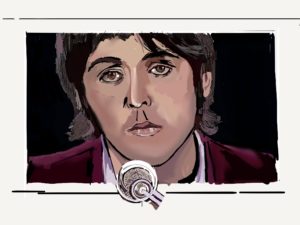Podcast: Play in new window | Download
 An entire book dedicated to a single song may strike some as bewildering, but not if the song in question is both The Beatles’ longest single (in length) as well as one of their most successful (quadruple platinum): 1968’s “Hey Jude.” Deceptively simple and universally appealing, the Apple Records debut marked an astonishing launch to their label while serving as an anthem of healing during a tumultuous year – in the world as well as within the band.
An entire book dedicated to a single song may strike some as bewildering, but not if the song in question is both The Beatles’ longest single (in length) as well as one of their most successful (quadruple platinum): 1968’s “Hey Jude.” Deceptively simple and universally appealing, the Apple Records debut marked an astonishing launch to their label while serving as an anthem of healing during a tumultuous year – in the world as well as within the band.
Author James Campion (Take A Sad Song: The Emotional Currency of Hey Jude) discussed the song with returning guest Jeff Martin and I for nearly two hours. You too will discover what James did – that uncovering the magic and pull of this recording is something that will take you farther than you can imagine.
Check out James’ writings here: https://www.jamescampion.com/
This podcast is sponsored by BetterHelp. Go to www.betterhelp.com/satb for 10% off your first month.


The episode touches on what an unusual name Jude is, but IMO it was a critical choice. Anything less unusual might have risked sounding foolish. Can you imagine a Hey Steve? Wouldn’t work.
On George’s role and the controversy over his suggested guitar part, I’ve never heard whether Paul rejected the idea after a tryout with the band or simply rejected it as a non-starter. The answer to that question would give us a better idea of whether George was justified in feeling snubbed.
That’s a great point Tom regarding George trying to “echo phrases” as i once heard Paul recount in a interview. Would love to hear a bootleg but dont think it exists.. We may never know all the details other than it hurt George, but in the end this was Paul’s song and he had the final say in this.
George had valuable input on many many songs but i also feel like this is
kind of like a violin player telling Beethoven how his 5th Symphony should be improved upon and then has a lifelong fit that his ideas were not used that one time.
I was struck by the notion presented that a key element of the song is the conceit of one guy talking to another, and what a rare idea that was. And it was, but one other example springs to mind — She Loves You — a song of similar impact at the beginning of their careers.
Harrison’s “Something,” for that matter, is also addressed to a third party (as opposed to the lover praised in the song): “You’re asking me will my love grow … You stick around and it may show …”
As was pointed out in this episode, another Beatles first was the repetitive ending to the song which was longer than the versus and choruses. Although another unique feature in the world of popular music that only the Beatles could have got away with at the time (on the radio), unlike other ground breaking advances in the art of songwriting, this one had a terrible lasting influence – the use of excessive repetition. Paul himself obviously came to the conclusion that this breakthrough of his was worthy of repeated use – especially during the early years of Wings, where, I would argue, some unfinished songs were completed by excessively repeating the bits that he had written.
Unfortunately, this has had a permanent dire affect on popular songs in the hands of artists who do not have McCartney’s talent for writing brilliant melodies. Incredibly, now you can write a ‘song’ consisting of a few notes repeated for over five minutes (while scatting over it), and for some reason this is accepted as being worth recording. No wonder George said in an interview in reference to modern song writing, “I just don’t get it”. Neither do I, George.
As for the supposed, “F**n hell!” from John, I heard that right from the first time I heard the song in 1968 when it came out, and I always thought he was saying “Make it now” as a cue to go into the coda section of the song because he says it right before the coda starts. That’s what my ears hear.
I wonder how the line “So let it out and let it in, Hey Jude” got in there twice, at 1:43 and 1:59.